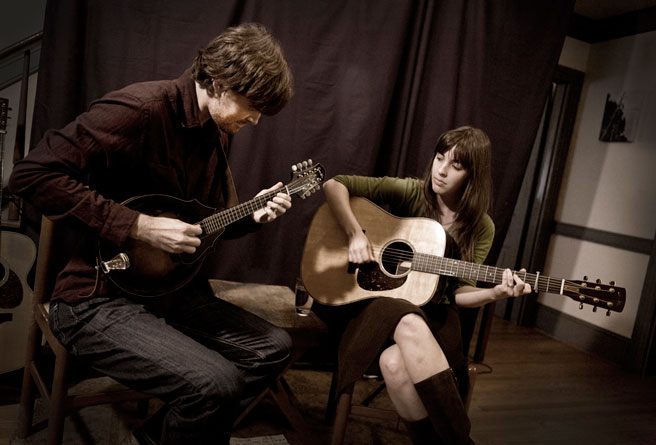The Honey Dewdrops (Kagey Parrish and Laura Wortman): Hearkening back to a gentler time, without sounding antiquated in the least.Here Comes The Sun
By David McGee
IF THE SUN WILL SHINE
The Honey Dewdrops
The Honey DewdropsInevitably, Laura Wortman and Kagey Parrish, the husband-and-wife duo making a name for itself as The Honey Dewdrops, are going to be compared to Gillian Welch and David Rawlings. Sharing a penchant for the melancholy in song is the most obvious common ground the two groups share, and Parrish, like Rawlings, is a six-string master, expert at inducing the most soulful, joyful noises out of mandolin and guitar, whereas Wortman, like Welch, plays a solid rhythm guitar and sings with haunting affectations in a voice that is not high lonesome but rather high and lonesome, especially the latter. The Dewdrops, though, are less self-consciously old-timey than Rawlings and Welch, and generally less studied and more nimble stylistically all around. In fact, the down-home warmth of even their darkest ruminations on this, their debut album, is reminiscent more of another husband-wife roots team, Bill Powers and Shelley Grey, in their incarnation as Honey Don’t (profiled in TheBluegrassSpecial.com, October 2009) than of Welch and Rawlings. For some it may be six of one, half dozen of another, but any way you cut it the Dewdrops have something unique and oftimes mesmerizing recommending them in their plaintive harmonies, easygoing rhythms, evocative arrangements, well-crafted original songs, and a genuine approach that can’t be learned in school but must flow from a life affirming need to connect with other like-minded souls. Like Honey Don’t, they hearken back to a gentler time, without sounding antiquated in the least.
The Honey Dewdrops (Kagey Parrish and Laura Wortman), perform ‘Wandering Boy’ from If The Sun Will ShineIt probably doesn’t need to be pointed out how deeply melancholy some of the tunes are, with titles such as “When Was The War,” “How We Used To Be,” “Without Tears,” “Don’t Leave Me Here,” and “Nowhere To Stand.” And indeed, there is much love lost herein, but resilience surfaces too—right off the bat, in fact, in the breezy toe-tapper, “Blues Blue Eyes,” in which the singers both bid adieu to a departed lover, fight through being “tossed about” and “knocked down,” but vow to prevail against their troubles, even while being haunted by the old flame’s “hey honey babe” greeting. When they fall, they fall hard, though. The subdued heartbreaker, “Without Tears,” lends the devastation of lost love the tint of spiritual yearning by dint of its hymn-like arrangement and a powerful, moving final verse writ like scripture, complete with an unspoken appeal for divine intervention: “My back is bent and broken/the weight around my neck/I just keep wandering/no earthly end in sight.” The album closing “Petals” is equally striking in its images of a life rent asunder by loneliness, “like petals on a slow stream,” and evokes the healing power of nature in “crickets there to laugh with me, singing when I moan” and “when I let the nighttime fold over me/then I’ll find you every time,” sung from a haunted soul, Parrish’s delicate, solemn fingerpicking providing an astringent setting for these mournful musings. “When Was the War” does not specify the conflict in question, but the story is that of a wife whose husband leaves for battle and returns permanently altered, not physically but emotionally and physically ravaged by the horrors of war (PTSD, clearly, but poetically rendered here). In contrast to the personal crises limned in other sad songs from the Dewdrops’ pens, “When Was the War” wastes no energy on sad reflection, but instead plays out over a terse, driving rhythm, its mood foreboding and seething all at once, in the process making one of the more disturbing, profound anti-war statements in recent memory.
That the Dewdrops get so deeply dark at points only makes the upbeat moments more effective. “Wandering Boy,” though a sayonara to a guitar pickin’ lad whose musical muse is bound to take him “this wide world over/never coming back to me,” sprints unhesitatingly ahead on the strength of Parrish’s brisk fingerpicking and Wortman’s spirited, undaunted vocal. “Stomping Ground,” though it recounts a woman’s leaving, captures a buoyant, optimistic spirit in its suggestion that the event in question is of a temporary nature, by way of its assuring chorus which likens her departure to that of the sun, and assures, “She’s coming back again,” in an easygoing, even comforting, backwoods arrangement awash in joyous feeling. So too does the instrumental workout “1918,” an occasion for Parrish to fashion a song-length mandolin solo, of 1:26 duration, that bends and curves and skips festively around and over Wortman’s sturdy rhythm guitar support, evoking not so much the year in question but rather the classic, rustic bluegrass template that has never fallen out of fashion. Which, come to think of it, might well serve as a description of the music of The Honey Dewdrops in years hence.
Founder/Publisher/Editor: David McGee
Contributing Editors: Billy Altman, Laura Fissinger, Christopher Hill, Derk Richardson
Logo Design: John Mendelsohn (www.johnmendelsohn.com)
Website Design: Kieran McGee (www.kieranmcgee.com)
Staff Photographers: Audrey Harrod (Louisville, KY; www.flickr.com/audreyharrod), Alicia Zappier (New York)
E-mail: [email protected]
Mailing Address: David McGee, 201 W. 85 St.—5B, New York, NY 10024



